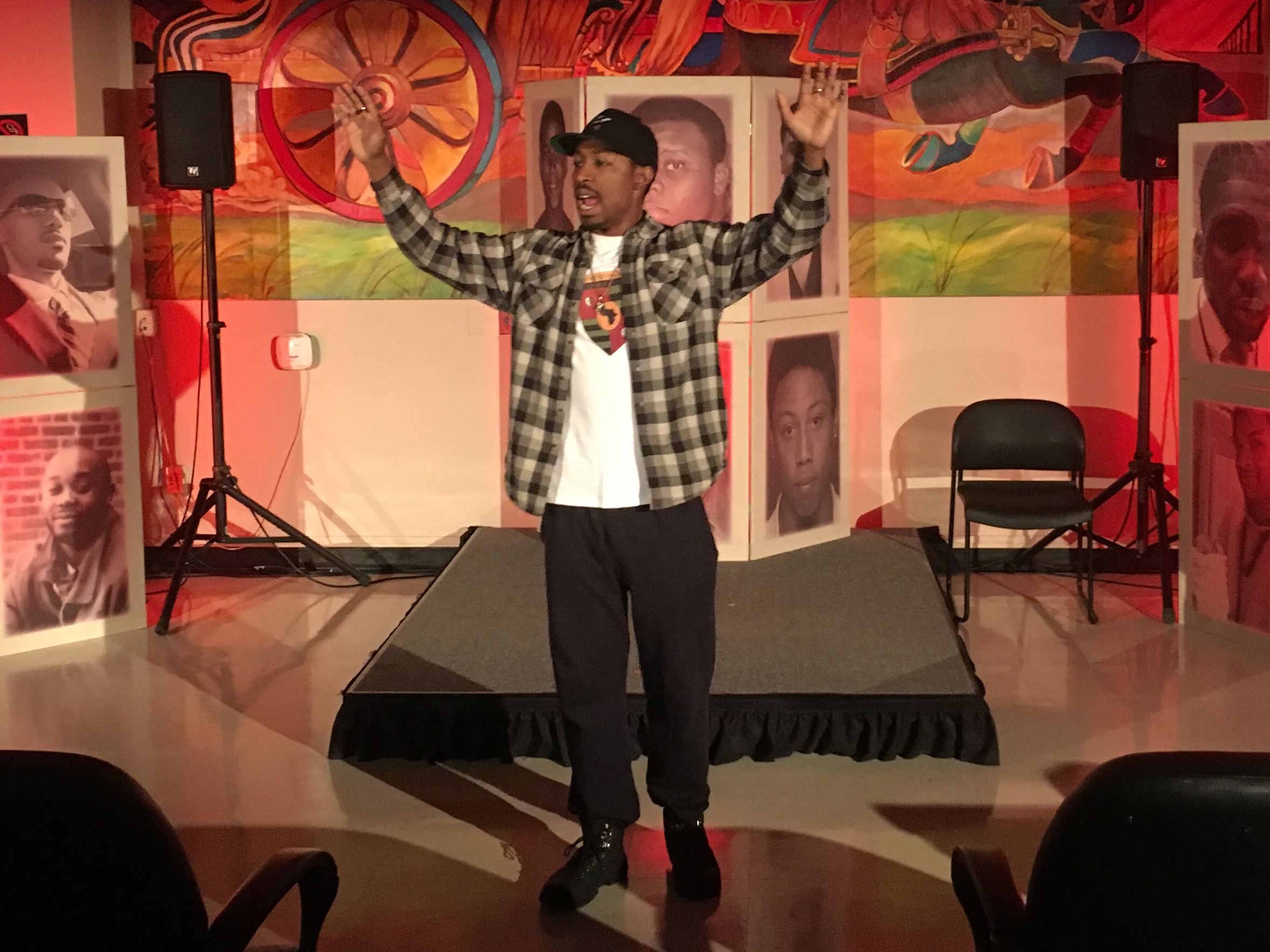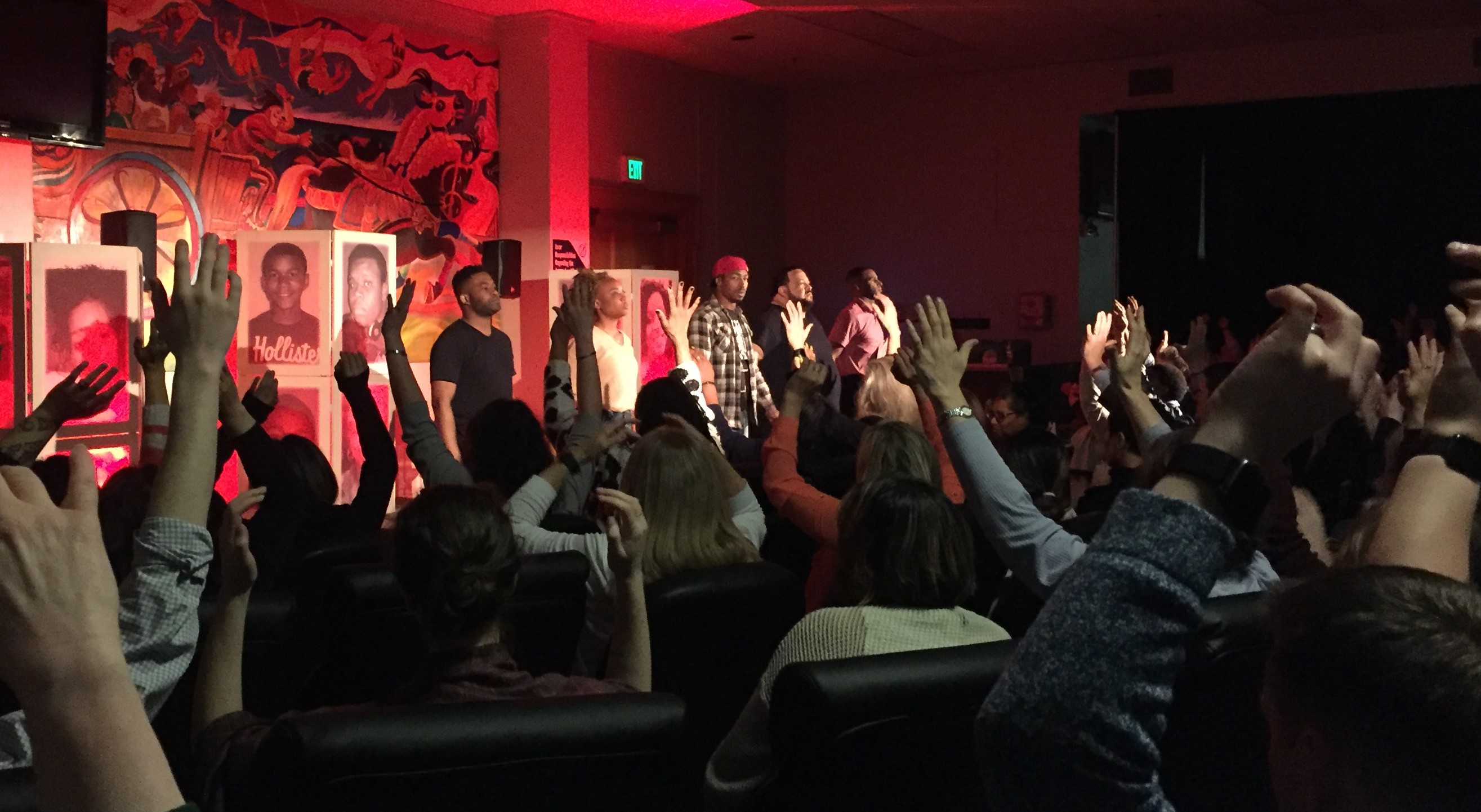From the Multnomah Lawyer: Hands Up: A Conversation About Racial Inequities in Our Justice System
 “This shit doesn’t happen to white men.”
“This shit doesn’t happen to white men.”
A 14-year-old boy leaves a performance at Carnegie Hall, brimming with excitement and possibility about his own future as a classical guitarist. Moments after walking out of the theater, he is surrounded by police officers, thrown against the hood of a police car, and held at gunpoint.
A teacher passes a slowmoving car while on his way home. When the car speeds up towards his rear bumper, he speeds up to gain some distance. The car closes the distance. Upon stopping at an intersection, he is surrounded by undercover police cars, pulled from the car, and thrown to the ground. Guns are drawn and pointed at his head. “Don’t move or I will blow your fucking head off.”
A young woman is being strangled by her boyfriend. She can’t breathe. She hears the police arriving, and he stops. The police arrive and he composes himself. He talks to them. Afterward, they turn to her, and her relief evaporates when they grab her arms to place them behind her back. She reacts with surprise and gets thrown to the ground, multiple grown men piling on top of her. She can’t breathe.
“I am tired of feeling so grotesque.”
When Kevin Jones, the director of The August Wilson Red Door Project’s presentation of Hands Up, introduced the special performance to the judges and staff of the Multnomah County Circuit Court, he admitted that he was initially afraid of doing the show in Portland. He began to explain why, but stopped and said, “You’ll find out soon enough.”
What followed was a raw, provocative performance that did not feign any niceties about the “lie that America doesn’t want to wake up from” - the lie of the superiority of white skin. It did not feel like your typical diversity training.
The performance, consisting of seven monologues written by six black men and one black woman, was part of the Multnomah County Circuit Court’s effort to address issues of equity and fairness in the court system. It was introduced by Judge Katherine von Ter Stegge, Cyndi Jefferson, and Roger Rand, members of the court’s Diversity and Equity Committee.
The committee, created in 2015 by Trial Court Administrator Barbara Marcille, includes judges and court staff and was formed to explore and address diversity and equity within the court’s workforce as well as to improve fairness for the public. The court began its educational and training outreach with a showing of the film “Cracking the Codes: The System of Racial Inequity,” a film which is now a standard part of new employee orientation at the Multnomah Circuit Court. They have since provided courtwide trainings for staff and judges on topics including implicit bias, trauma informed practices, the #MeToo movement, institutional equity, and procedural fairness. A continuing lunch and learn series has featured dozens of speakers from different ethnic and cultural segments of the community to offer their perspectives on these issues to members of the court system.
This effort comes in the context of a national conversation about racial inequities and institutional bias. The increasing proliferation of surveillance and body cameras has begun to provide repeated, graphic accounts of violence inflicted by law enforcement on people with black skin. This has helped bring to the surface long-simmering racial tensions in a country founded on principles of equality and justice but also within the context of brutal systems of colonization and chattel slavery.
 It also comes amidst an increasing recognition of Oregon’s own history of colonial white supremacy, and of the fact that some of its remnants remain in our justice system. Writing from the bench in 2016, then Multnomah County Circuit Court Judge Bronson James described clearly how during Oregon’s founding and early history, explicit steps were taken to protect a “free white society” from the threat posed by “potential black-incited Indian uprisings.”1 A repeal effort of Oregon’s constitutional provision banning black people from the state was defeated by voters five times between 1900 and 1916 before the provision was removed from the Constitution in 1927. The 20s and 30s featured a resurgence of racial animosity and resulted in new laws and regulations aimed at diminishing the voice of minority Oregonians in our communities, including, as Judge James found, a nonunanimous jury system.
It also comes amidst an increasing recognition of Oregon’s own history of colonial white supremacy, and of the fact that some of its remnants remain in our justice system. Writing from the bench in 2016, then Multnomah County Circuit Court Judge Bronson James described clearly how during Oregon’s founding and early history, explicit steps were taken to protect a “free white society” from the threat posed by “potential black-incited Indian uprisings.”1 A repeal effort of Oregon’s constitutional provision banning black people from the state was defeated by voters five times between 1900 and 1916 before the provision was removed from the Constitution in 1927. The 20s and 30s featured a resurgence of racial animosity and resulted in new laws and regulations aimed at diminishing the voice of minority Oregonians in our communities, including, as Judge James found, a nonunanimous jury system.
Hands Up did not address Oregon’s history specifically, but it did not pull any punches in addressing the black community’s perspective on how its members can be treated by the justice system. It was an uncensored and deeply personal exposition of, as Jones put it, “seven psyches of the African American Spirit.” It was designed to make the listener - especially the white listener - uncomfortable mentally, emotionally, and physically. It’s difficult to describe the sensation of having defense mechanisms I didn’t realize were there activated and meticulously prodded for two hours while surrounded by court staff and judges.
In his opinion in Williams, Judge James wrote that “[n]either the parties, nor the public, are served by attempts to marginalize the realities of a past that today we find uncomfortable or unpleasant.” In welcoming Kevin Jones and the cast and crew of Hands Up into the courthouse, the leadership of the Multnomah County Courthouse proved they are not afraid of welcoming and acknowledging the uncomfortable and unpleasant realities regarding race that remain in the present. It was a challenging, and ultimately expanding and heartening experience.
View All Articles